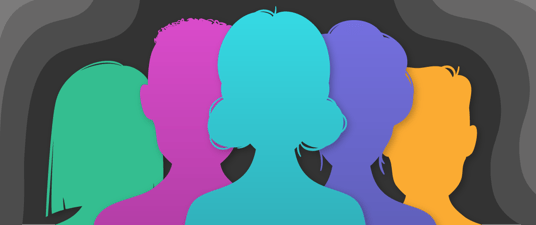What personality types do you see in a successful tech startup? Pt. 2
A little more than a year ago I asked my colleagues to take the personality quiz at 16personalities.com so I could understand what kind of people needed to come together to stand up a tech startup and operate successfully. My career began at a fortune 500 Security Company, then I went onto a mid to late-stage startup, and 2 years ago ended up here as the 17th employee before we even had a public beta. Because early startup life was so new to me, I was intrigued by the thought that the ex-Googlers and MIT alum that I now worked had something in common with me to be working together to build this thing called mabl. You can read my findings from last year here.
Since that post, we’ve grown about 3X - at the time of writing we have about 60 employees, we’re at a new office with room to grow to 170 people (no more bathroom queues!), and last but not least, we have revenue! I thought this was a good time to do another analysis to see how this undulating organism has changed as we’ve grown and figured things out.
Obligatory Disclaimer: I am not a personality expert. We're all unique little snowflakes, and personality frameworks aren’t intended to put anyone in a box, but they’re a good way to get a high-level understanding of your potential strengths and weaknesses and the reasons behind your quirks. Take this analysis with a grain of salt and enjoy the read!
If you're not familiar with 16 Personalities, it's very similar to the Meyers Briggs framework where you fall somewhere between each of these four spectrums:
(I) Introverted ← or → (E) Extroverted - The source of your energy. Are you a people-person (E) or do you need to recharge with time to yourself (I)?
(S) Observant ← or → (N) Intuitive - How information is perceived. Do you take more cues from what's happening around you (S), or internally, through past experiences, imagination, etc (N)?
(T) Thinking ← or → (F) Feeling - How information is processed, how decisions are made. Are they influenced more by emotions (F) or logic (T)?
(J) Judging ← or → (P) Prospecting - How you act upon the information you've processed. Are you more likely to create a plan and follow it (J), or are you more likely to improvise along the way and keep an open mind (P)?
With the basics out of the way, let’s take a look at the personalities at mabl.
Personality Type Breakdown
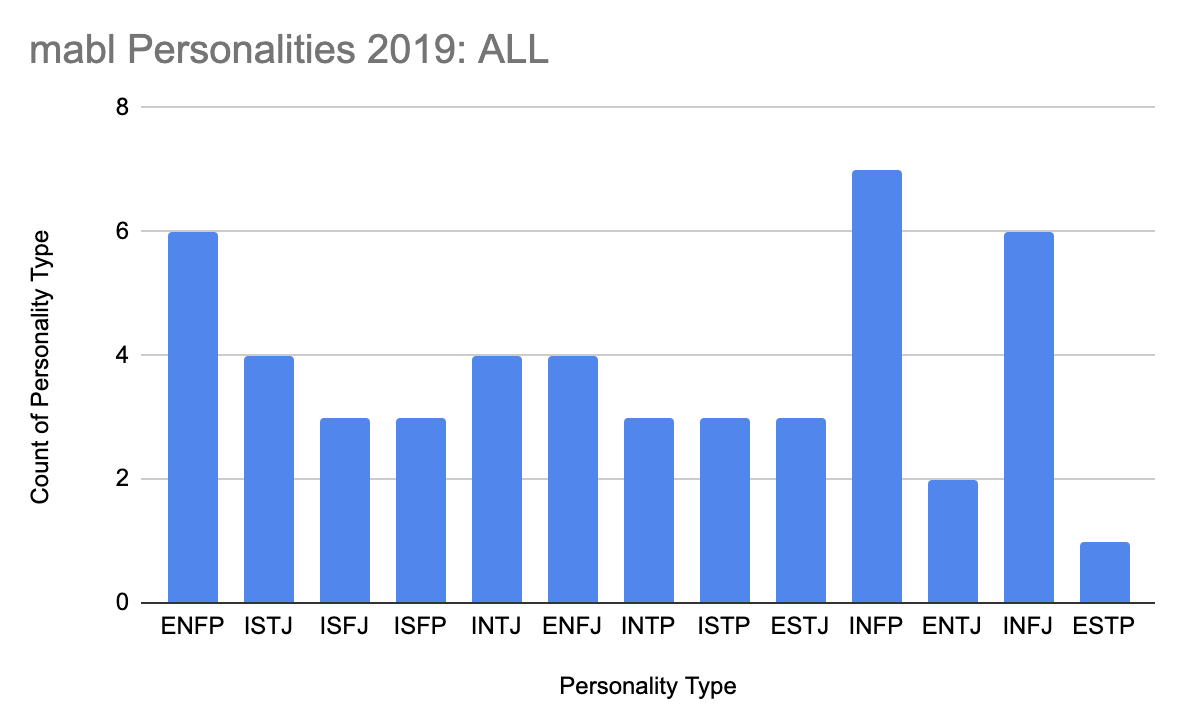
Overall, the most popular personality type is of the *NFP variety. According to 16personalities.com, the INFP personality comprises just 4% of the population, and ENFP 8% of the population. Though rare personality types, I think the way mabl’s interview process goes here contributes to this a lot. In short, without revealing too much about our interview process, we look for people who believe in the product and believe in each other. They must be driven idealists who support their peers along their journey.
Besides variance in introversion and extroversion, 1 in 4 mablers share the same “energy” (how we see the world and process information), “nature” (how we make decisions and cope with emotions), and “tactics” (our approach to work, planning, and decision-making). What does this mean, exactly? I’ll expand on these 3 areas below and explain how these traits are applied at mabl.
Energy
"Intuitive individuals are very imaginative, open-minded and curious. They prefer novelty over stability and focus on hidden meanings and future possibilities."
The goal of many startups is to disrupt an industry by bringing a simpler, more accessible solution to an underserved problem. You can’t necessarily do that if you’re approaching the problem the same way it always has been. An article from The Next Web states: “The most successful innovative disruptors don’t merely attempt to provide ‘the same service, only better’ than the competition. They seek to change the way people think about the way they perform certain tasks.”
So an ingredient to a founding a successful startup is having an inclination toward novel solutions, in the sense that it’s something new, original, and unique. It involves being able to see the future affected by your vision:
91% of those with the Intuitive trait say they like to discuss different views and theories of what the world could look like in the future, compared to 55% of those with the Observant trait.
From day one to now, I think we've always probed the status quo and asked ourselves "is this the best way this problem can be solved, especially with DevOps software delivery practices today?" I think that's why we decided that Selenium wasn't enough for the average software team shipping new code multiple times a day. I think that's why we decided that end-to-end testing should encompass external communications like email and PDF testing - not just components of the core application. Without playing with theory and imagination, we wouldn't be here today.
Nature
Feeling individuals are sensitive and emotionally expressive. They are more empathic and less competitive than Thinking types and focus on social harmony and cooperation.
Since the last post, we actually updated one of our core values which used to be Positivity, Drive, and Insight. We removed Positivity because it made mablers uncomfortable bringing up problems and discussing them in fear of not being in harmony with the company values.
We since put together a DEI (Diversity, Equity, and Inclusion) team that looked at anonymous comments from a recent Employee Engagement Survey and took keywords and themes that appeared most often to describe what mabl does well. Here are some of the notes to the change in company value:
Two major themes that stood out were how great people on the team are, and how transparently information is communicated in the company. When we started grouping the keywords by what we felt made this team great, and why transparency seemed so important, “Supportive” and “Authentic” emerged as words that embodied the present and aspirational qualities of the two major themes from the responses. With “Supportive,” you can empower others, or receive empowerment. With “Authentic,” you are empowered.
To prioritize a DEI team to take the time to discuss such a nuanced problem - and then take action from it - takes emotionally intelligent and aware people to start. There's no question this is accurate when describing mablers.
Tactics
According to this article from the Harvard Business Review, industry disruption is no longer a game of chance, but opportunities can be scoped out and targeted based on a rather simple Disruptability Index mapped out by Accenture. If you decide to leave a cushy job for an early-stage startup, you might be doing it for a change of pace, or to be able to have more impact, but you’re probably also seeking an opportunity to win big, which is right in line with Prospecting personalities.
Prospecting individuals are very good at improvising and spotting opportunities. They tend to be flexible, relaxed nonconformists who prefer keeping their options open.
Another quote about Prospecting personalities read:
If they aren’t satisfied with something in their lives, it’s easier for them to let go of it and choose something else. This can lead to serial passions that keep Prospecting individuals stimulated as they explore the buffet of choices always before them.
One of the biggest advantages of operating like a startup besides the velocity at which you can ship new features and updates is the agility at which you can move. Plans change A LOT around here as we get feedback on our product roadmap from our users. If an opportunity to provide something more valuable to our users comes up, we will reprioritize our roadmap and adjust the plan for the next available sprint.
But this also means that you’ve got to be prepared to wear many different hats and contribute to many different projects. As a marketer, I get to go from writing content, to design, to brand, to product messaging, sometimes all in one day. The versatility of my role plays well with my “stream of consciousness” work style and I'm sure it's similar with mablers in engineering, CS, and sales.
How did personality traits change from 20 to 60 employees?
Last year I looked at personality traits by role. It didn’t change too much - both the GTM (go-to-market) and product teams only shifted by one letter each.
PRODUCT
Product shifted from INFP to INFJ:
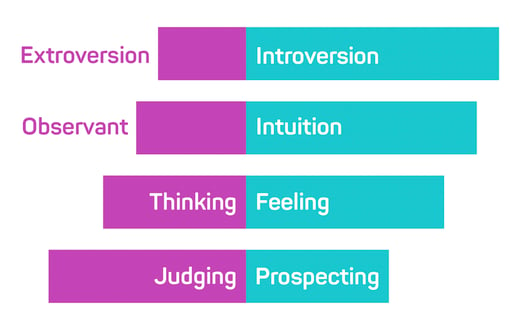
GTM
GTM shifted from ENFP to INFP:
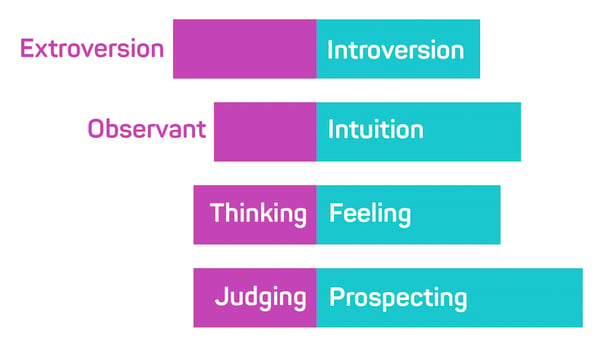
People with this personality type need to know that their work helps people and promotes their own personal growth. Their work must be in line with their values, principles, and beliefs all the way.
Oftentimes, the best way for these personalities to achieve this is not to have to answer to others’ rules at all. Instead, they should strive to be their own boss, neither above nor below anyone else, just directly interacting with the people and ideas that are important to them.
INFP and INFJ personalities are highly motivated by their values, principles, and beliefs, needing "to be able to express their creativity and insight" and also needing to "know that what they are doing has meaning" in their jobs. Because these personality types are driven by such conviction, if/when the product of their work come under criticism, (especially unwarranted criticism), "their morale is likely to tank spectacularly."
Because we're all so emotionally invested in our work, I think we've witnessed the latter played out in meetings or 1:1s, which is why we now have in every conference room a reminder of the meeting ground rules. Yes, they should be ingrained etiquette, but we take one step further of giving the meeting host the responsibility of enforcing these ground rules and curbing the conversation if anyone starts to step beyond these rules. Even with a meeting moderator, however, we know that it's still our personal responsibility to make sure that everyone is putting into practice our Supportive value so that everyone can feel free to be Authentic.
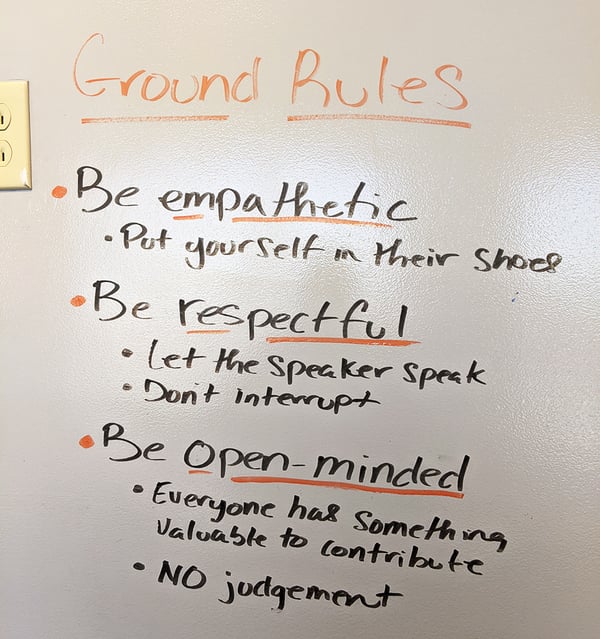
Weaknesses to look out for
Since the personalities in Product and GTM ended up so similar to each other, I didn't want to analyze how each team operated differently according to the different roles this time around. Instead I looked at the potential weaknesses of these *NFP personality types to make us aware of pitfalls that we may be susceptible to.
Take Things Personally
These personalities often takes challenges and criticisms personally, rather than as inspiration to reassess their positions. People with this personality type are highly vulnerable to criticism and conflict.
Perfectionistic
These personalities are all but defined by their pursuit of ideals. While this is a wonderful quality in many ways, an ideal situation is not always possible – in politics, in business, in romance. These personalities often drop or ignore healthy and productive situations and relationships, always believing there might be a better option down the road.
Always Need to Have a Cause
These personalities get so caught up in their pursuits that any of the cumbersome tasks that come between them and their ideal vision is deeply unwelcome. These personalities like to know that they are taking concrete steps toward their goals. If routine tasks feel like they are getting in the way – or worse yet, there is no goal at all – they will feel restless and disappointed.
Can Burn Out Easily
Their passion, impatience for routine maintenance, idealism, and extreme privacy tend to leave these personalities with few options for letting off steam. People with this personality type are likely to exhaust themselves in short order if they don’t find a way to balance their ideals with the realities of day-to-day living.
At the end of the day, we came to mabl because we saw an opportunity to improve ourselves and nurture our ideas amongst others who we believed would reciprocate. As long as we stay open to the opinions of each other, while holding strongly to our own beliefs, we can grow and encourage the people at our workplace, our communities, our city, and eventually, the world.
If you're looking for that too, you can check out our job openings here:
https://www.mabl.com/join-the-team
Thanks for reading :)


